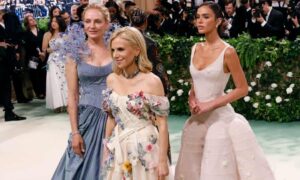
As pro-Palestinian protests unfolded blocks away and Israel carried out airstrikes on Rafah, the Met Gala took place in New York on Monday evening devoid of political statement.
Attenders wore dramatic dresses made of sand or tens of thousands of crystals, had teams of helpers lug heavy trains and wore suits akin to three-seater sofas. Yet any sartorial statement about what was happening beyond the red carpet was absent. The nearby chants of protesters did nothing to pierce the vacuum.
It “felt really dystopian”, said Venetia La Manna, a campaigner for fair fashion who posted a video on Instagram this week in which she pointed out the absurdity: “As our favourite celebrities took to the red carpet and voluntarily lost the ability to breath and move, Israel seized control of Gaza’s Rafah border crossing, halting the flow of aid, leaving Palestinians nowhere safe to go. They are involuntarily losing the ability to breathe and move.”
Previous Met Galas have not been so devoid of politics. In 2021, the congresswoman Alexandria Ocasio-Cortez caused controversy by wearing a dress emblazoned with “Tax the Rich”. In 2018, to coincide with the “Heavenly Bodies: Fashion and the Catholic Imagination” theme, the actor Lena Waithe wore a rainbow cape. The Gilded Glamour theme of 2022 – a reference to the opulent 19th-century gilded age – provoked several attenders to dress to make a statement, including Riz Ahmed, who used his outfit to draw attention to the role of immigrant workers “who kept the gilded age going”.
“Fashion cannot turn its cheek,” says La Manna. “Fashion is inherently political. Clothing is political. Fabrics are political. It’s art, right? And art is inherently political. For an event that is so based around celebrating art, it just felt like a missed opportunity for not a single statement to have been made.”
